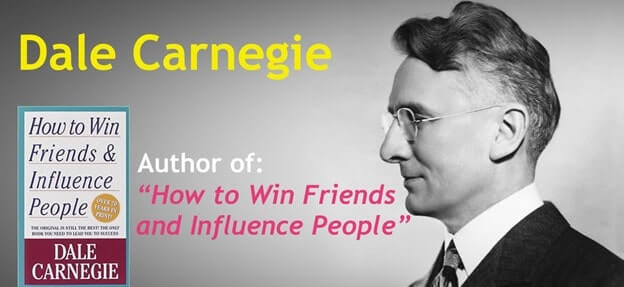
Photo credit-bookurve.com
DALE CARNEGIE (1888-1955), became famous by showing others how to become successful. His book How to Win Friends and Influence People (1936) has sold more than 10 million copies and remains very popular because of his illustrative stories and simple, well-phrased rules.
Every salesperson struggles to close sales from time to time, so today I’m recommending some guidance from Carnegie that will no doubt be helpful, although we no longer speak as he did 85 years ago when he wrote this book. His advice is, “Arouse in the other person an eager want. He who can do this has the whole world with him; he who cannot, walks a lonely way.” In his own words of that day, here is Carnegie’s advice.
Carnegie continues; “Why talk about what we want? That is childish, even absurd. Of course, you are interested in what you want. You are eternally interested in it. But no one else is. The rest of us are just like you: we are interested in what we want. So the only way on earth to influence other people is to talk about what they want and show them how to get it.
One time I rented the grand ballroom of a certain New York hotel for twenty nights in each season in order to hold a series of lectures. At the beginning of one season, I was suddenly informed that I should have to pay almost three times as much rent as formerly. This news reached me after the tickets had been printed and distributed and all announcements had been made. Naturally, I didn’t want to pay the increase, but what was the use of talking to the hotel about what I wanted? They were interested only in what they wanted. So a couple of days later I went to see the manager. “I was a bit shocked when I got your letter,” I said, “but I don’t blame you at all. If I had been in your position, I should probably have written a similar letter myself. Your duty as the manager of the hotel is to make all the profit possible. If you don’t do that, you will be fired and you ought to be fired.
Now, let’s take a piece of paper and write down the advantages and the disadvantages that will accrue to you, if you insist on this increase in rent.” Then I took a letterhead and ran a line through the center and headed one column “Advantages” and the other column “Disadvantages.” I wrote down under the head “Advantages” these words: “Ballroom free.” Then I went on to say: “You will have the advantage of having the ballroom free to rent for dances and conventions. That is a big advantage, for affairs like that will pay you much more than you can get for a series of lectures. If I tie your ballroom up for twenty nights during the course of the season, it is sure to mean a loss of some very profitable business to you.
“Now, let’s consider the disadvantages. First, instead of increasing your income from me, you are going to decrease it. In fact, you are going to wipe it out because I cannot pay the rent you are asking. I shall be forced to hold these lectures at some other place. “There’s another disadvantage to you also. These lectures attract crowds of educated and cultured people to your hotel. That is good advertising for you, isn’t it? In fact, if you spent five thousand dollars advertising in the newspapers, you couldn’t bring as many people to look at your hotel as I can bring by these lectures. That is worth a lot to a hotel, isn’t it?”
As I talked, I wrote these two “disadvantages” under the proper heading, and handed the sheet of paper to the manager, saying: “I wish you would carefully consider both the advantages and disadvantages that are going to accrue to you and then give me your final decision.” I received a letter the next day, informing me that my rent would be increased only 50 percent instead of 300 percent. Mind you, I got this reduction without saying a word about what I wanted. I talked all the time about what the other person wanted and how he could get it. That is so simple, so obvious, that anyone ought to see the truth of it at a glance; yet 90 percent of the people on this earth ignore it 90 percent of the time.”

Photo credit-rightattitudes.com
So the point of this week’s post is to realize that your sales prospects don’t care what you want, but will often agree to outside-the-box suggestions if they are led to what they want.
————Comment from a Hoosier————
“Doug’s book is the first one I’ve ever bought online that arrived with a personal note written inside, along with the author’s signature. What a smart move! Natalie K. – Ft. Wayne, USA
———————————————————————
©2022 Robinson Training Solutions, LLC


